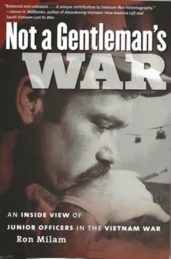Not a Gentleman's War
Not A Gentleman’s War
An Inside View of Junior Officers in the Vietnam War
Ron Milam (The University of North Carolina Press – Chapel Hill)
Author Ron Milam is an Associate Professor of Military History at Texas Tech University, and an infantry OCS graduate during the Vietnam War who served as an infantry advisor to Montagnard forces in that war.
His excellent book is a treatise of the gritty work performed by junior officers in that unique war and the fact the vast majority served with skill, dedication and commitment to the men they led.

Those suppositions offered by Milam are backed by meticulous and wide-ranging research, documented by field reports and evaluations than ran up the chain of command to the top: The Military Advisory Command Vietnam (MACV).
This book is a primer for junior leadership in war which graphically points out that the infantry company was the most important organizational unit in most battles, and that junior officers leading their men was the most critical element.
It is no surprise that OCS-trained junior officers stood out in analysis after analysis as being the highest rated in effectiveness at the junior officer level. Moreover, the OCS concept once again supported the Army’s crucial needs for leadership at the company level. West Point could only provide five percent of the officer requirement and once ground forces were introduced to Vietnam, ROTC saw a precipitous drop of enrollment by about 75% by 1972. Moreover ROTC-commissioned officers typically selected noncombat arms branches as their choice of service.
The build up in the OCS program could barely keep pace with the military’s needs, and particularly with the Army’s rapid deployments of units. And the Army’s growth in deployments to Vietnam far outpaced the other branches, including the Marines.
The author discusses in detail the junior officer process for selection during the Vietnam era, the training and evaluation in OCS, ROTC and the Military Academy. That discussion is followed by a careful analysis of training in Vietnam, rules of engagement given to the junior leaders, discipline and “atrocious behaviors”. The Calley-My Lai aberration is studied in detail.
OCS graduates who went to Vietnam…THIS IS YOUR BOOK! The authors careful analysis and citing of many studies proves time and time again that OCS-commissioned junior officers in Vietnam performed above and beyond their counterparts in an exceedingly difficult and controversial war.
